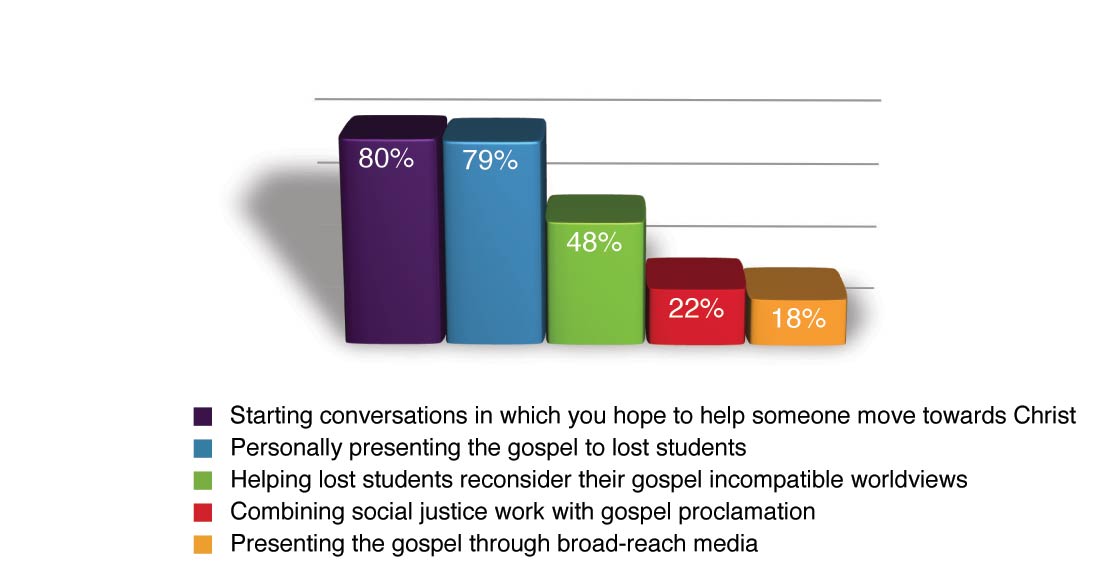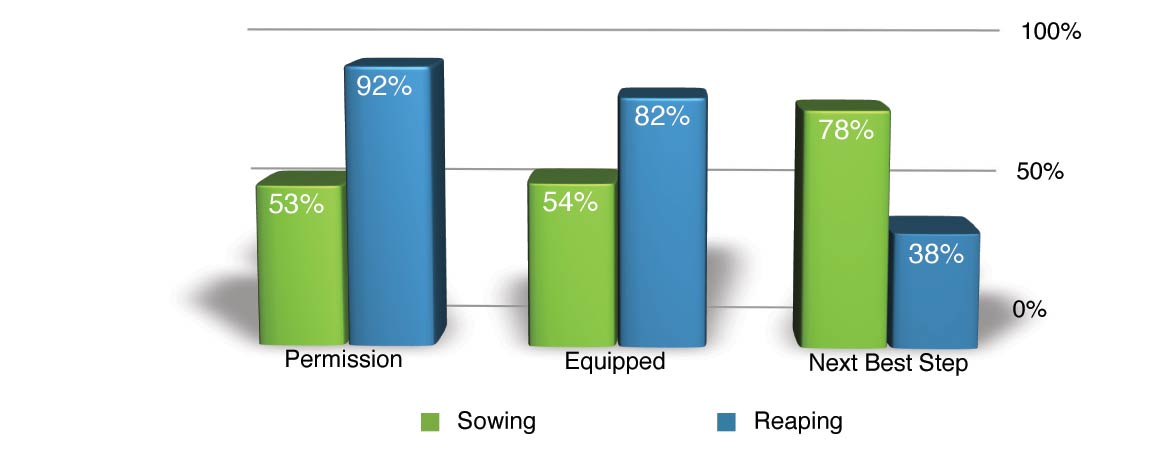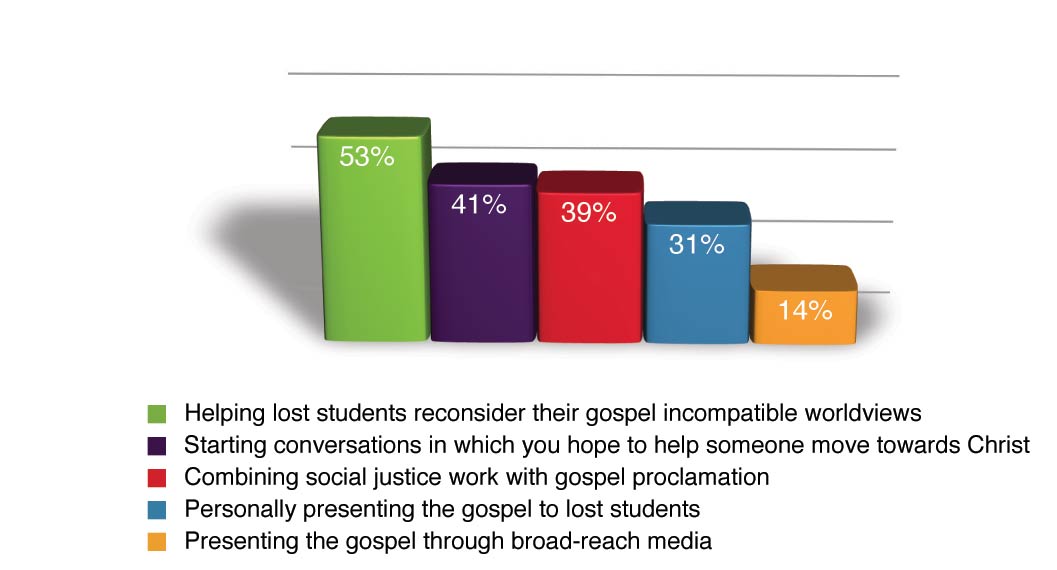Campus Crusade Staff
In late October 2009, Carrie Walker sent an email to all USCM staff, on our behalf, soliciting their input on a survey about their satisfaction and effectiveness in evangelism. We are pleased that 311 staff completed the survey; 44 participants were from the Mid-Atlantic region.
Some of the questions sought numerical rankings from the staff, and others were open-ended, soliciting essay-like responses. First, the numbers.
1. Numerical Rankings
A. Staff effectiveness in evangelism
Staff were asked how effective they are at a variety of evangelistic activities. Respectively, 80% and 79% of our staff feel they are effective or very effective at “starting conversations … to move someone toward Christâ€Â and “personally presenting the gospel to lost students.â€
Self-reported effectiveness drops to 48% when our staff are asked about “helping lost students reconsider their gospel incompatible worldviews.â€Â Effectiveness drops further to only 22% when asked about “combining social justice work with gospel proclamation.â€
Our staff seemed the least confident in their ability to “present the gospel through broad-reach media.†Only 18% reported that they are effective or very effective.
B. Sowing and Reaping
We also asked staff to report the extent to which they felt they had received permission and equipping to participate in sowing activities and reaping activities. We compared these rankings to the degree that they feel each of these activities is the next best step for students on their campuses.
A slim majority (53%) of our staff agreed or strongly agreed that they have permission to spend time on sowing activities. A similar number (54%) feel equipped in this. A clear majority (78%) feel that these less championed activities are the next best step for students on their campuses.
An overwhelming majority (92%) of our staff agreed or strongly agreed that they have permission to spend time on reaping activities. A smaller but still strong majority (82%) feels equipped to do so. However, only 38% feel that the skills which they are encouraged to perform are the next best step for students on their campuses.
Another interesting finding is that while only 5% of our staff disagree with the 78% who hold that sowing is the next best step for lost students on their campus, 31% of our staff disagree with the 38% who advocate for reaping as the next best step.
C. One new tool, approach, training component or resource to help our evangelistic activity
Staff were also asked to choose (from a list of six options) which type of evangelistic resource they would find most helpful.
The top choice (53%) of our staff (selecting it as their first or second preference) was a resource that would, “help lost students reconsider their gospel incompatible worldview.â€
We found 41% of staff requested help “starting conversations in which we hope to help move someone towards Christ.â€Â Similarly, 39% preferenced help “combining social justice work with gospel proclamation.â€
Interestingly, despite the fact that our staff feel particularly ineffective at using broad-reach media for outreach (18% reported they are effective or very effective in this), only 14% indicated a desire for help in this area. This may indicate our staff don’t feel this is an important area in which to be effective.
Taken together, the numerical data we gathered suggests several things. While there is no unanimous opinion as to what we need to do as an organization evangelistically, there are, however, clear views held by healthy majorities.
• We know how to share the gospel presentationally.
• We are less skilled in pre-evangelistic activities, termed “sowing†in this survey, and there is a strong interest in improving this skill.
• There is a perception among our staff that they have received too little equipping, and too little permission to sow, despite their perception that it is the next best step for students on their campuses.
• We are very unskilled in combining social justice with gospel proclamation, and there is also an interest in improving here.
• We are unskilled in using media, but there is little corresponding interest in
developing this skill.
2. The Essays
There were three essay questions in the survey and one objective question that received a large number of comments in the “other†box. The essay questions inquired about our staff’s most satisfying and most frustrating experiences in the last year and then gave them an unrestricted opportunity to opine on evangelism. The objective question that received many comments asked our staff to suggest a resource they would find most helpful.
The sheer volume of comments received and diversity of opinions expressed in them makes it difficult to summarize. However, we feel there is much value in them. Below are several quotes representing the responses to each question followed by (our) concluding thoughts on the lessons learned from these responses.
A:Â What is the most satisfying and effective evangelistic activity in which you have been a part in the last year?
“[Soularium is] what I most enjoy because of the deep discussion that happens so quickly.â€
“Soularium has been the easiest and most user-friendly tool I’ve used this year.â€
“I am a Mom, so I haven’t been on campus much, but I love Soularium.â€
“Soularium always seems to go well, and students always seem to like it, even if the conversation doesn’t transfer over to the gospel.â€
. . .
“I love the relationships with International Students – getting to know them, understanding where they are coming from… it isn’t ‘activity,’ it’s relationships that I am in.â€
“Holding a free lunch for International Students each week… we get to share our faith every single week with them as we build relationships.â€
“[My interaction with International Students] feels real and ongoing.â€
. . .
“Summer Project in OC, NJ. We saw more people indicate decisions for Christ than I have seen in 10 years.â€
“Doing Polaroid surveys on the Tribeca Arts Summer Project.â€
Without prompting, staff mentioned Soularium by name 68 times when asked to comment on their most satisfying experiences in evangelism. However, some staff note it can be difficult to transition to a fuller presentation of the gospel. In addition, though it’s very good in achieving spiritual conversations, it is “not effective in reaping fruit.â€
Second in satisfaction was a tie between Summer Project experiences and sharing with International Students. One staff noted that the ongoing relationship he’d forged with a Chinese student feels “real and ongoing.â€
What is the common thread between these three satisfying evangelistic activities? We think the answer lies in the ongoing, highly relational context that each produces. Soularium quickly creates a warm conversation, even with a stranger. Summer Projects foster a strong community within the group and at the workplace (USSP), which makes ongoing relationships possible. And, the best example may be International Students, who thrive on developing relationships with Americans … the very thing most staff crave in a campus environment where constant new relationships can be so difficult to forge.
Finally, one staff member expressed not satisfaction, but honest disappointment:
My first reaction is that none of them have been satisfying because not a single student has received Christ as a result of an evangelistic activity I have been involved in during the last 12 months. I am well aware that it is the Holy Spirit who changes hearts, but I have a growing frustration and sadness over my inability to lead a team in fruitful ministry.
B:Â What is the most frustrating thing about the evangelistic activity in which you have been a part in the last year?
“Not having strategic conversations. I also get worn down and frustrated by engaging in so many ‘random evangelism’ conversations.â€
“Doing randoms-still don’t like it.â€
“The constant initiating with surveys begins to wear on me when I don’t see much come from the conversation. I understand the training value, but it becomes exhausting and something I’m just supposed to do. The great conversations seem to be fewer and further between.â€
“Access to dorms no longer exists due to tighter security on campus.â€
. . .
“[I get frustrated] when I meet people who need a tool that doesn’t assume they are already on board with Law 1, and I don’t have a useable tool for that.â€
“Feeling the pressure to get to the booklet when the people you are sharing with aren’t ready for the booklet.â€
. . .
“Trying to have ongoing conversations with students after the initial follow-up.â€
“Not being able to sustain many long-term relationships with spiritually interested non-Christians.â€
“Student apathy to anything spiritual on our campus. Both from non-Christians and Christians alike. This makes it hard to energize Christian students to share their faith, and makes it frustrating when we do try to share.â€
“The fact that 90% of the people I see pray to receive Christ with me do not move on to becoming Involved New Believers.â€
. . .
“Stats don’t account for building relationships, just gospel presentations.â€
“Most frustrating is the ‘narrow band’ of end results we are being asked to report.â€
There were many responses to the question about staff frustration in evangelism. Many complained of disappointment over ministry-mode evangelism. Since losing access to dorms, many have found randoms as their default mode, with little satisfaction. Others observed problems using the Four Laws, often citing an incongruence between its fitness to the task at hand and pressure they feel to use it. Others lamented apathy among the students. Finally, we heard repeated complaints about our success criteria’s inability to measure what may be the most valuable activities on campus.
There were a number of other responses in which the frustration ran in an entirely different direction.
“I am frustrated knowing that there are so many other students who would respond to Christ and want to
grow if someone would just tell them.â€â€œWe feel like the field is ready for harvest, but we are a bit short on laborers to follow it all up.â€
“Probably my biggest frustration is that I/we don’t do it more often.â€
C:Â If Campus Crusade could come up with one tool, approach, training component, or resource to help you in your evangelistic activity, what would you like the focus to be?
“I long to graduate students with transferable skills that are adaptable to the workplace, neighborhood, etc.â€
“How to start conversations with people with the intent of building authentic relationships with them and with the goal of sharing the gospel… i.e.- How to make non-Christian friends (in my experience, this is the biggest hindrance to the gospel being spread… our Christian students don’t know how to build bridges and become friends with non-believers).â€
“Creating ways that we can rub shoulders in a meaningful, relational way with the lost, so that in the context of relationship we can introduce someone to Christ.â€
“It is about relationships and loving people. I love the tools we have (including the short films).â€
“Learning to listen well needs to be relearned for us all. This is why I love Doug Pollock’s book, Godspace.â€
“Something that just helps students be around more lost students and develop evangelistic relationships through ministry mode efforts and/or natural life.â€
“Letting go of the idea that we have to have a conversion agenda in our interactions.â€
Far and away the most repeated comment from our staff is that they want help in a natural mode of evangelism. They believe that not only are these skills needed on campus, but they will transfer to post-college life far better than the ministry mode skills we have historically emphasized.
D:Â Please share any additional thoughts you have about how Campus Crusade should pursue greater evangelistic effectiveness.
It is clear that many staff feel that our evangelism efforts aren’t sufficiently effective. Staff want to know and be trained in something that would help:
“[I] feel the culture has shifted and we are missing the mark with our evangelistic efforts. Lots of conversations. Little fruit. Something is off. Please HELP.â€
“What the organization asks for statistically (success criteria) reflects what we value.â€
“The success criteria don’t seem to give much importance to sowing.â€
“Even though sowing is something that people say is good and acceptable, much of everything else in our ministry screams that it’s not. Our stats are reaping only! Almost all of our training is for ‘randoms.’ Randoms end up equipping our students to do something that has almost no relevancy to them after college. These techniques are not ones you can use in the work place.â€
“It would be helpful if The Four Laws were placed in a historical meta-narrative. The Four Laws are all about how you can know God personally and experience his love. This can lead to a few problems: when presented with the option of a relationship with God they just say ‘No thanks, I’m having a great life without it.’ Very few of them, however, would object to the fact that the world is messed up, and the hope of its redemption could be more appealing than just having a more fulfilling life.â€
“I am so grateful National is asking us about this! I think these questions at the end nailed what is going on. In our stats we highly value reaping, but not sowing almost at all. But the problem is that most students are now much further away from the gospel than in the 50’s when CCC started. Therefore we have to move toward training in sowing so much more, because that is the next best thing for the majority of lost students. The majority of lost students, I feel, are not ready to be brought to a point of decision, and truly need more of a process. We are really good at reaching the people who are ready to make a decision, but that group is shrinking in the US. So I think these are the exact questions we need to be asking.â€
“I took an evangelism course about a year ago, and it really challenged me and some of evangelism paradigms. . . mainly that it is ‘all about reaping’ and how we use the Great Commission as a call to reap, when it is a command to make followers of Christ, and not so much to make converts. I love some paradigms shifts that we are beginning to consider that men like Doug Pollock and Randy Newman are helping us make.â€
“Most would agree that the culture is radically different in Boston today than it was at UCLA in 1951…so why are 15 year old practices from the mid-west still being pushed?â€
There were lots of different opinions expressed under additional comments. Most staff felt we are not as effective in evangelism as we were years ago due to cultural changes. Many suggest we are stuck in older approaches that seem ineffective. Several staff felt like we would benefit by creating a higher value for “sowing†types of evangelism and holistic approaches to sharing the gospel. Perhaps recreating a new version of the Knowing God Personally booklet or another tool that would relate to deconstructing worldviews. There must be more of an emphasis on helping new believers walk with God, not simply make a decision.
In contrast to the majority view, a few staff expressed opinions in favor of our traditional approaches.
“I think Crusade should go back to the way it was in Bill Bright’s day, where you just shared the gospel right away in the power of the Holy Spirit, etc. No ‘earning your right to speak.’ No ‘post-mod relating efforts.’ No apologetics to work up to it.â€
“My personal feeling is that staff don’t have any problem starting conversations. They either don’t know how or have lost the value in moving someone to a point of decision.â€
Conclusion
These Staff surveys persuade us of the following:
• There is a large disparity between the evangelistic activities our staff feel they have permission to spend time on, and the evangelistic activity that they feel is the next best step for the typical lost student.
Our staff feel they are expected to reap, but that the lost on campus would be better served by more sowing.
It may be wise to make it plain to our staff that they do in fact have permission to spend their time sowing. Stating this explicitly and repeatedly, and reinforcing with new success criteria may be means to this end.
• Our staff want assistance in developing their pre-evangelistic skills.
When asked to identify a tool, approach, or training component they most desire, the majority of staff requested a resource that would “help lost students reconsider their gospel-incompatible worldview.â€Â The creation of such new tools, training resources and approaches will better equip our staff.
When asked what they’d find helpful, the most repeated comment from our staff was that they want assistance in natural-mode evangelism. They believe that these skills are not only most in demand on campus, but they are critical in the post-graduation, lifelong ministry for which we hope to prepare our students.
• Finally, our staff expressed the greatest satisfaction in evangelistic experiences that are heavily rooted in a relational context.
When asked an open-ended question about their satisfaction in evangelism, staff mentioned Soularium by name 68 times. Sharing with international students and sharing while on summer project were also frequently noted. It is significant that the context for all of these is highly relational.
To read other people’s comments or enter your own please click here.


